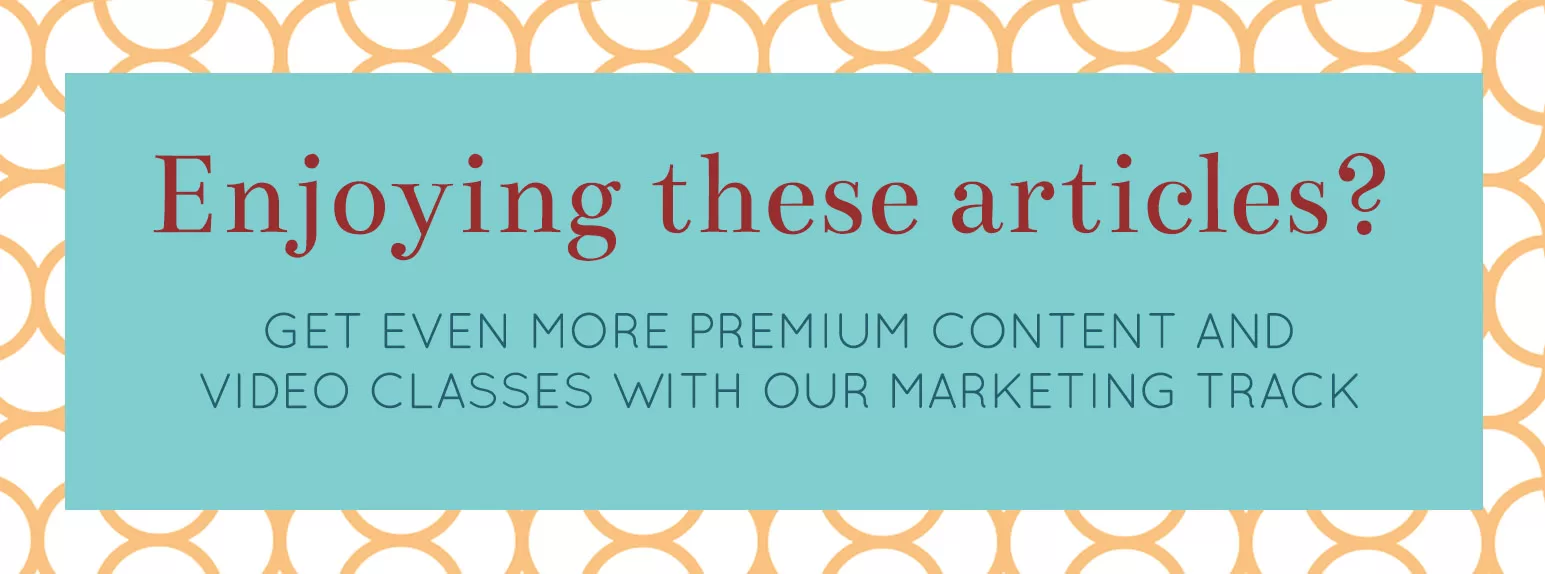Mastering Content Marketing for Authors
Strategies to Engage and Grow Your Audience
Part 1: Intro to Content Marketing

Marketing experts always talk about the importance of Content Marketing…but how does it work for authors?
You may have heard people talk about Content Marketing as one of the most important ways that you as a writer and potential online marketer can find and connect with an audience. Then people start talking about technical things like Keywords, CTR, CTA, Conversions, etc and, as a writer, it becomes really easy to tune it all out and assume it’s not for us or that the learning curve is so steep that we’ll never get there.
Happily, that couldn’t be further from the truth. It is important, but it can also be very simple.
What Is Content Marketing?
I’d define Content Marketing as creating something that you believe that your potential fans would be interested in. As a writer, that means, for the most part, creating written content. In fact, that’s mostly what’s meant when any marketer talks about content marketing.
Why Articles Are the Primary Means of Content Marketing
Even though the internet has grown to include all kinds of other media (content) like video and music and podcasts, the primary medium of the internet is still, and will likely continue to be, WORDS. Primarily written words.
This is how we interact with the internet. We read words, we ask questions using written (or sometimes spoken words), but in the end it all comes down to text.
Words can be skimmed in a way that videos can’t. Words make it easy to determine if an article has the content we want in a format we want to interact with.
Articles also have an interesting power because when someone else reads them, they’re hearing them in their head, in their own voice.
Search Drives Content Marketing
In the end, the evolution of the internet has meant that whoever can deliver what we’re looking for most and most quickly wins. Success with search engines comes down to just a few things (and yes, I believe this will hold true even in the era of potential AI searches) :
Keywords, content quality, and reader engagement and intent
Keywords
Keywords are how we’ve searched the internet since the beginning of time, and again, I doubt that’s changing any time soon. If I want to find vacation rentals at my favorite spot, I’m going to search “Outer Banks Rentals.” We’ve all done this many thousands of times in our lives. We’ve gotten to the place where we can also ask questions: “How do I make Hollandaise sauce?” But even questions are still keywords. “Outer Banks,” “Rentals,” and “Hollandaise Sauce” are going to appear on those searches.
Content Quality
Search results are going to be ranked by the apparent quality of the content they provide. When it comes to the question, “How do I make hollandaise sauce?” if a site shows you the history of Hollandaise sauce, that might be interesting to you, but if it shows you a detailed recipe for Eggs Benedict, you’re almost certain to read and engage with that site for a long time. If that site’s recipe isn’t clear, however, you might go back and choose another one. Your interactions and behaviors with both the site and the search engines help determine how it ranks the quality of the content.
Similarly, websites with the words “Outer Banks” and “Rentals” will be ranked differently depending on how the words appear. If someone mentioned their vacation on the Outer Banks and the discusses their rental car, chances are that site isn’t going to be ranked as highly as a rental agency. This all comes down to search intent.
Reader Engagement and Intent
When you search for something and you click on a link that doesn’t have what you want, what do you do? You go immediately back to the search results and start again, right? This is how search engines determine intent. That story about an Outer Banks vacation with the broken down rental car isn’t what I wanted when I searched for a vacation rental, and it’s going to realize that quickly. Also, the fact that I spent hours going through pages and listings picking out the perfect rental house and then spending money there tells the search engines that was a pretty good suggestion.
The same can be true for your content as an author. If someone searches for something and you’re a good match, people will spend time actually reading your articles. They might also seek out others you’ve written. They’re going to engage with you, and when they’ve engaged with you, the search engines will recognize that engagement and reward you for it.
Other Kinds of Content Marketing
There are lots of other kinds of content marketing out there. The rise and popularity of Instagram and YouTube prove this beyond a doubt. And yet, searches are still driven in the same way: words and audience intent. You still search both platforms with words, and tools like hashtags make it easier for both the search functions of the sites and the audience to get a sense of the intent of others like them.
Other kinds of content also have the added benefit of connecting readers with you in other ways than just as an author. There’s a deep connection that gets made just by seeing your face on a YouTube video or hearing your voice in a podcast. If you create beautiful images for Instagram, people will be drawn to your sense of artistry in ways that words never quite achieve.

The Importance of Content Marketing For (Indie) Authors
I can’t stress enough how important content marketing is for authors. You’re writers, after all! Content Marketing at its core is just writing—even if you’re creating content for other platforms that aren’t just words. What’s more, it’s a kind of storytelling, so even if you’re a novelist writing fiction, don’t think that it doesn’t apply to you. Storytellers always have a leg up because humans respond to story.
Content Marketing Is How Readers Find You
Now that we’ve talked about what content marketing is, it’s obvious that this is how readers might be able to find you. Now I hear you thinking, “That’s great, but what content do I create to get them to find my books?” This is particularly difficult if you’re writing fiction. If you’re a nonfiction author, you probably know a bit about this process and already have some ideas of what you can write. But if you’re a novelist, don’t worry, this can actually be a benefit…after you’ve done some potentially hard work.
If you know why you write what you write and have a sense of the themes in your book, you should be able to get some ideas for content marketing. Once you have ideas about those, do some searches of your own. What would you look for? This is probably what others like you are looking for too.
Once you have this and have started writing, a funny thing happens: You might not talk about your book at all! Believe it or not, this is a good thing. If searchers (on their way to being readers, who are on their way to being fans) find you and feel like you’re just trying to sell to them, there’s a good chance they’ll just bounce back to the search results and try again. But if you give them what they’re looking for, they’ll stay and they’ll engage. And once you have an engaged audience, the “buy” is often automatic.

Content Marketing Is Where Your Readers Learn That You Can Write
We live in a world where we primarily buy books on line. That makes it hard to just pick up a book and flip through a few pages to read and see if it catches our attention. Even if you have samples available, that’s still no guarantee that someone will actually read that sample, much less actually buy your book.
The hard truth is that readers, at least before they become your fans, don’t care about your books. There are millions of others out there already to choose from. So you have to do your part to get them to become your fans or trust you enough to give your book a shot. Content Marketing provides you a chance to show off your writing talents.
Content Marketing Is Where You Can Make a Personal Connection
When you’re creating content for your (potential) readers, you’re hoping that they’ll connect with the same things you already have. You’re engaging with them over something they already care about—that’s why they’ve come to your website, after all.
If you’re able to engage with them deeply—emotionally—through your writing and also your insights, they’re going to go deeper. That might mean reading another article, signing up for your newsletter, or even buying a book.
But first you have to make that personal connection that says, “I’m one of you!”

Content Marketing Creates Investment—in You!
When someone has taken the time to search out a topic and chosen your content from among all the choices and taken the time to read what you’ve written, they’re invested in you.
Humans naturally take their investments in their time and their choices even more seriously than their monetary ones. They’ve chosen you to trust, and once that happens, they’re unlikely to change course easily.
Unfortunately many authors make it easy for readers to change course. They don’t create the ability for readers to go deep and become True Fans. Once a reader invests in you, your next goal, the next thing that Content Marketing gives you, is the ability to go deep. That is, write more articles—create more content.

The Math of Content Marketing
As I’ve mentioned in other articles, there is a math to marketing—lots of it, in fact. But the truth is we don’t spend much time on it because you can get too far into the proverbial weeds if you do. But here’s a quick summary:
To make (more) money as a writer, you can get more fans, create more content, or sell it for a higher price.
Content marketing can bring you all of these. First, as we’ve seen already, content marketing can bring you more fans. It also creates a deeper connection with them.
Second, when you have a deep connection with your fans, they tend to be more willing to pay for whatever you produce—even at a higher price. And, if you’re selling on your own site, you have a higher profit margin.
Third, if you’re mastering Content Marketing, you’re already creating great content. This content can be expanded and expounded upon to create content that’s valuable enough to sell. Maybe it’s a book or a short story or novella or a class or a podcast or a video or anything else that you might think up. Lots of people even sell access to their content itself—assuming that it’s considered valuable enough by their audience.
In the end, your math as an author gets much better if you’re able to master Content Marketing with this strategy and some creativity.

